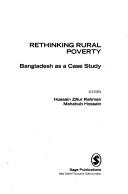| Listing 1 - 4 of 4 |
Sort by
|

ISBN: 8170364337 Year: 1995 Publisher: New Delhi Thousand Oaks London Sage Publications
Abstract | Keywords | Export | Availability | Bookmark
 Loading...
Loading...Choose an application
- Reference Manager
- EndNote
- RefWorks (Direct export to RefWorks)
Book
Year: 2011 Publisher: Washington, D.C., The World Bank,
Abstract | Keywords | Export | Availability | Bookmark
 Loading...
Loading...Choose an application
- Reference Manager
- EndNote
- RefWorks (Direct export to RefWorks)
This paper uses household survey data collected in September-October 2009 on a nationally representative sample of 2,000 households in Bangladesh to examine the nature of shocks experienced by households over the preceding 12 months and the type of coping mechanisms that were adopted. The analysis finds that more than half the sample claimed to have faced a shock-economic, health, climatic, or asset related-over the previous year. Surprisingly, the non-poor face a larger share of these shocks compared with the poor. A closer look at this result shows that the non-poor report a significantly larger share of "asset-related" shocks, which is consistent with the fact that the poor have fewer assets to lose. Health-related shocks dominate and households appear to have coped with these shocks through savings and loans, help from friends, and depletion of assets. The results show that households, when faced with covariate shocks due to climatic reasons, are less able to cope. As would be expected, the poor are less able to cope with shocks compared with the non-poor; the poor are more likely to use coping mechanisms that could have negative welfare implications in the longer term, including the depletion of assets, reduction of essential consumption, and use of high-interest loans. Econometric analysis suggests that geographical location, socio-economic status, and access to microfinance all affect the ability to cope with shocks. Policy implications include the importance of developing safety nets that take into account the vulnerability to climate-related shocks and further developing the links between micro-finance and safety net programs.
Access to Finance --- Housing & Human Habitats --- Microfinance --- Poor --- Rural Poverty Reduction --- Safety nets --- Safety Nets and Transfers --- Shocks --- Small Area Estimation Poverty Mapping --- Social Protections and Labor --- Bangladesh
Book
Year: 2011 Publisher: Washington, D.C., The World Bank,
Abstract | Keywords | Export | Availability | Bookmark
 Loading...
Loading...Choose an application
- Reference Manager
- EndNote
- RefWorks (Direct export to RefWorks)
This paper uses household survey data collected in September-October 2009 on a nationally representative sample of 2,000 households in Bangladesh to examine the nature of shocks experienced by households over the preceding 12 months and the type of coping mechanisms that were adopted. The analysis finds that more than half the sample claimed to have faced a shock-economic, health, climatic, or asset related-over the previous year. Surprisingly, the non-poor face a larger share of these shocks compared with the poor. A closer look at this result shows that the non-poor report a significantly larger share of "asset-related" shocks, which is consistent with the fact that the poor have fewer assets to lose. Health-related shocks dominate and households appear to have coped with these shocks through savings and loans, help from friends, and depletion of assets. The results show that households, when faced with covariate shocks due to climatic reasons, are less able to cope. As would be expected, the poor are less able to cope with shocks compared with the non-poor; the poor are more likely to use coping mechanisms that could have negative welfare implications in the longer term, including the depletion of assets, reduction of essential consumption, and use of high-interest loans. Econometric analysis suggests that geographical location, socio-economic status, and access to microfinance all affect the ability to cope with shocks. Policy implications include the importance of developing safety nets that take into account the vulnerability to climate-related shocks and further developing the links between micro-finance and safety net programs.
Access to Finance --- Housing & Human Habitats --- Microfinance --- Poor --- Rural Poverty Reduction --- Safety nets --- Safety Nets and Transfers --- Shocks --- Small Area Estimation Poverty Mapping --- Social Protections and Labor --- Bangladesh
Book
ISBN: 146481239X Year: 2018 Publisher: Washington, DC : World Bank Group,
Abstract | Keywords | Export | Availability | Bookmark
 Loading...
Loading...Choose an application
- Reference Manager
- EndNote
- RefWorks (Direct export to RefWorks)
Urbanization --- 2000-2099 --- Dhaka (Bangladesh) --- Bangladesh --- Economic conditions
| Listing 1 - 4 of 4 |
Sort by
|

 Search
Search Feedback
Feedback About
About Help
Help News
News